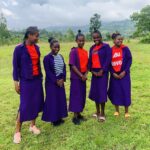Ethiopia (Wolaita Zone), 2017-2024, Girls’ Education Challenge; UKAid
STAGES (Supporting the Transition of Adolescent Girls Through Enhancing Systems) with funding from UKAid Girls’ Education Challenge broke down the barriers to education for girls in rural Ethiopia, with a particular focus on the most disadvantaged. We tackled a critical shortage of access to secondary education, social barriers that prioritise boys’ education over their female peers, and multiple factors that lead girls to miss school days or drop out early.
Key facts
Results
- 85% of girls in grade 8 improved in literacy and 73% improved in numeracy
- Social-emotional learning support built girls’ confidence, improved their interpersonal skills and helped them manage their emotions better
- Improved transition, and intention to complete secondary education: 93% of grade 10 girls want to continue their education
- 100% of teachers reported that gender inclusive and responsive pedagogy training was very useful
- Improved community and family support for girls’ learning: 79% of girls said their parents or caregivers pay for everything they need to go to school and 95% reported feeling safe travelling to and from school
- Through scale-up of project interventions by zonal government, an additional 456 schools, 12,182 teachers, and 460,070 learners have been reached
All information from external evaluation in 2024. See more highlights from the project midline and endline reports, and the final reflections report from the Girls’ Education Challenge.
I would have been forced to get married and drop out of school because of my father’s wishes. The project made me believe that I can continue my education and achieve my dream of becoming a doctor in the future.
Girl studentKey activities
- Strengthening school leadership for girls’ education through professional development of school leaders and local government staff and inclusive data collection and analysis
- Improving teaching quality by strengthening CPD on inclusive, child-centred pedagogy, improving teachers’ foundational literacy and numeracy, and building capacity to provide remedial support
- Engaging the community to better support schools through management structures, Mother and Father Groups and gender clubs
- Direct, material support to girls including Social and Emotional Learning (SEL) provision, learning materials, bursaries and sanitary protection
- Opening up access to secondary education through the construction of four new secondary schools, upgrading school toilets and creating safe spaces for girls during menstruation via sanitation rooms

